County nutrient webinar covers all things manure
By Alejandra Pulido-Guzman - Lethbridge Herald on February 9, 2022.
 Herald file photo
Dairy cows graze in an area field. A nutrient management webinar series offered by Lethbridge County gave producers information on manure spreading and storage regulations.
Herald file photo
Dairy cows graze in an area field. A nutrient management webinar series offered by Lethbridge County gave producers information on manure spreading and storage regulations.LETHBRIDGE HERALDapulido@lethbridgeherald.com
The nutrient management webinar series offered by Lethbridge County concluded Monday with a presentation on manure spreading and storage regulations.
Trevor Wallace from Alberta Agriculture, Forestry and Rural Economic Development spoke about Part 2 of the Agricultural Operation Practices Act (AOPA) which encompasses the livestock and manure management regulations which were included into AOPA in 2002.
“The purpose of AOPA is to ensure the province’s livestock industry can grow to meet the opportunities presented by local and world markets in an environmentally sustainable manner,” said Wallace.
He said the regulations apply to anybody who is handling manure, including crop producers, custom manure applicators, livestock producers and confined feeding operations.
“Within the legislation manure, compost, composted materials, organic materials, are all considered the same thing…but the exact same requirements apply to compost as well,” said Wallace.
He explained that manure must be incorporated within 48 hours except when the manure is directly injected into the soil, applied to forages, applied to direct crops or applied on frozen or snow-covered land.
“They have to be 30 meters away from a water well or 30 meters away from a common body of water,” said Wallace.
He explained that a common body of water is, as defined by the legislation, the bed or shore of a water body that is shared by more than one land owner.
Wallace said that for un-incorporated manure – the manure applied to forges or to direct seeded crop – they have to be 150 meters from a neighbouring residence or other occupied building, 30 meters from a water well and 30, 60 or 90 meters from a common body of water based on the the slope of the land.
“Another important feature of our legislation, or requirement of our legislation is test requirements,” said Wallace.
He said he would suggest it be done on a more regular basis and by everyone who deals with manure, but under the legislation tests are only required if the operation is spreading more than 500 metric tons per year.
“Those soil tests can’t be older than three years, you have to have a one time soil analysis for zero to six and six to 12 of soil texture, and every three years a nitrate-nitrogen level for a zero to 60 depth and a soil salinity test on the electrical conductivity,” said Wallace.
He said these tests are good for management and planning. AOPA requires records be kept for five years on manure production, manure transfer and manure application.
On the storage requirements of manure, Wallace said he wanted to keep both subjects separate.
“With short term manure storage, temporary storage that we have in the field… could also be outside throughout the yard…they do not require a permit,” said Wallace.
He said even though they do not require a permit they have many regulations, among them are the fact that it can be stored up to seven months on one location in a three-year time period.
“That might be seven consecutive months in one location, and then you cannot use that same location for three years. Or it could be a couple of months this year, couple months next year, and a couple months the year after,” said Wallace.
He said this was a requirement to reduce nuisance effects, but also around servers and groundwater impacts to reduce the accumulation of nutrients under and directly around the pile of stored manure.
Wallace explained short term storage also has setbacks. They have to be one meter above the water table, one meter above the one in 25 year maximum flood levels, 150 meters from a residence or occupied structure, 100 meters from a spring or a well and they also should be 30, 60 or 90 meters from a common body of water depending on the slope of the land.
“One thing I did want to mention is permanent long-term… I’m going to bring them up here because they may have a role or they can have a role in the management of field application,” said Wallace.
The permitting process for long term manure storage includes neighbour notification.
“There are construction standards associated with permanent storage, liner requirements, surface and water controls, ground water protection,” said Wallace.
He said operation must have nine months storage, surface water control systems and liner requirements.
“But there is nothing that says that the permanent storage has to be in a yard, permanent storages could be built on anywhere,” said Wallace.
For more resources and information visit http://www.agric.gov.ab.ca/aopa or http://www.nrcb.ca
Follow @APulidoHerald on Twitter
4-3




